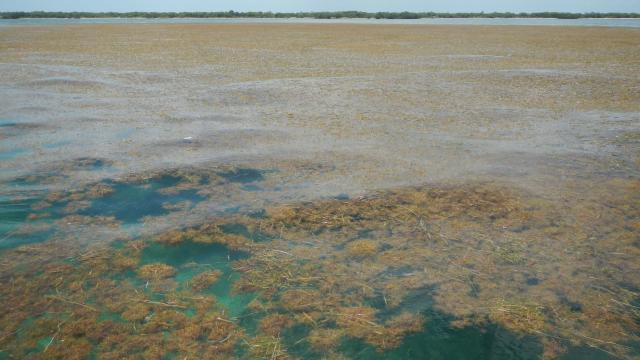Scientists in Florida have detected the largest seaweed bloom in the world. Extending from the Gulf of Mexico to the African coast, the unusually large bloom is threatening marine life and coastal regions, with the researchers warning it’s likely a sign of things to come.
New research published this week in Science describes the Great Atlantic Sargassum Belt (GASB) — the largest single expanse of macroalgae in the world. The enormous belt of seaweed is composed of floating, photosynthetic brown algae, called Sargassum.
The authors of the new study, led by Chuanmin Hu from the College of Marine Science at the University of South Florida, attributed the unusually large bloom to both human-causes and natural processes, saying such “recurrent blooms may become the new normal”.
For the study, Hu’s team looked at satellite observations gathered by NASA’s Moderate Resolution Imaging Spectroradiometer (MODIS) from 2000 to 2018.
The first 10 years of observations showed isolated patches of Sargassum strewn across the Atlantic, but the microalgae experienced an explosion in 2011 and in the following years, appearing in places not normally known to host the stuff. The oversized GASB was observed to form in 2015 and again in 2018.
In mid 2018, a single, uninterrupted belt of Sargassum was observed to stretch for 8850km from West Africa to the Gulf of Mexico. In total, the gigantic patch weighed an estimated 20 million tonnes — a mass heavier than 200 fully loaded aircraft carriers.
Normally, Sargassum creates habitat for a variety of marine life, including turtles, crabs and fish. These patches also generate oxygen via photosynthesis.
But like so many things in life, too much can be a bad thing. Too much Sargassum chokes out marine life, making it hard for some species to move and breathe. When it dies, the microalgae sinks to the bottom of the ocean, where it can snuff out ecologically important corals and seagrasses.
It can also cause problems on beaches. As many sunbathers will attest, rotting Sargassum is wholly unpleasant, releasing hydrogen sulfide gas that smells like rotten eggs.
Last year, GASB threatened shores of the tropical Atlantic, Caribbean Sea, Gulf of Mexico and the east coast of Florida. Barbados went so far as to declare a national emergency when troves of the microalgae threatened its valuable tourism industry.
“The ocean’s chemistry must have changed in order for the blooms to get so out of hand,” said Hu in a USF press release.
Indeed, the researchers say the unusual growth is on account of two main factors; one natural and one caused by humans.
The natural cause has to do with nutrients from deep beneath the ocean along the African Coast rising to the surface where Sargassum grows.
The unnatural cause has to do with the Amazon River, which pours nutrients into the ocean during the spring and summer — nutrients that are now in overabundance owing to deforestation and the excessive use of fertilisers.
“The evidence for nutrient enrichment is preliminary and based on limited field data and other environmental data, and we need more research to confirm this hypothesis,” said Hu. “On the other hand, based on the last 20 years of data, I can say that the belt is very likely to be a new normal.”
To bolster their case, the authors analysed fertiliser consumption patterns in Brazil, along with deforestation rates in the Amazon — both of which matched nicely with the Sargassum growth trend beginning around nine years ago.
Looking ahead, the researchers would like to develop a model to predict the growth of blooms in the future. They’d also like to know if the Sargassum is somehow affecting fisheries.
“We hope this provides a framework for improved understanding and response to this emerging phenomenon,” added Hu. “We need a lot more follow-on work.”
